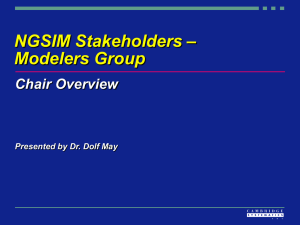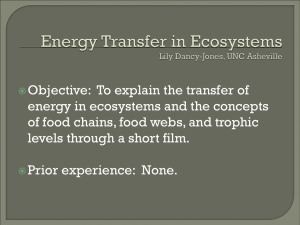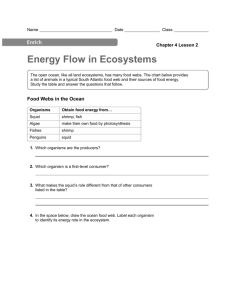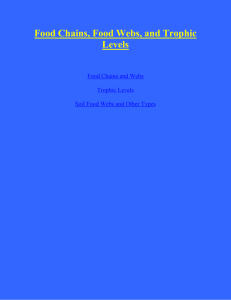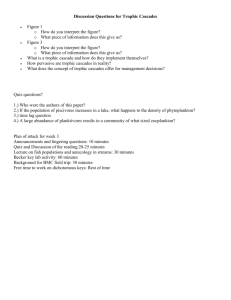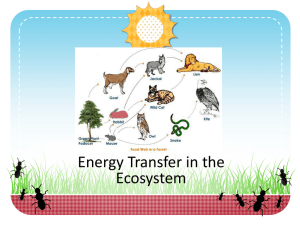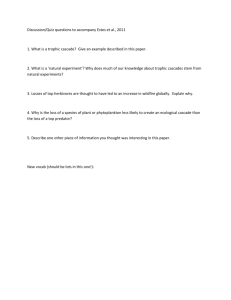Food webs and trophic dynamics, with a view towards
advertisement
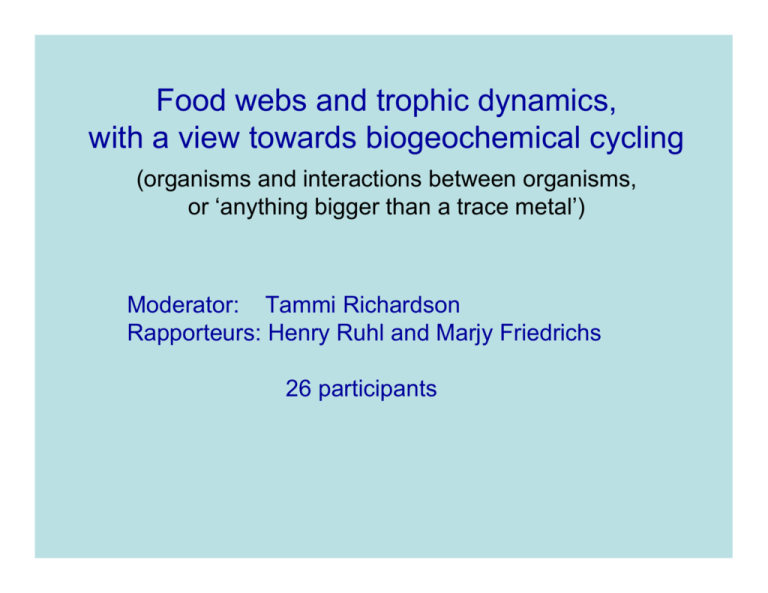
Food webs and trophic dynamics, with a view towards biogeochemical cycling (organisms and interactions between organisms, or ‘anything bigger than a trace metal’) Moderator: Tammi Richardson Rapporteurs: Henry Ruhl and Marjy Friedrichs 26 participants 1. What are the key unknowns? Who’s there and what are they doing? (functional groups; few long time series, so don’t know whether species have shifted; genetic diversity vs. functional diversity) Effects of ocean acidification/climate change processes on community structure (and vice versa; feedbacks between these processes) Mesopelagic (JGOFS concentrated on skin of ocean) Grazer control of biogeochemical diversity (zooplankton excretion, respiration rates, behavior) Forams (alkalinity and saturation state) Benthic food webs (benthic photosynthesis) Stoichiometry between carbon and other elements Biomineral associations with carbon When do we need more complexity in models? How do we feed all this information back into models? 2. What observations and modeling studies are needed to improve our understanding? Better coordination between modelers and observationalists: need modelers and observationalists to work together on projects from beginning Observations: Different time/space scales (interannual; micro-scale; satellite/global; thin layers) Global observations of quantities other than chlorophyll Benthos (bioturbation; carbon sequestration; benthic photosynthesis) Physical processes such as mixing occurring on mesoscale For some questions, need trophic levels above zooplankton (legacy of GLOBEC) Take better advantage of paleo information 2. What observations and modeling studies are needed to improve our understanding? Better coordination between modelers and observationalists: need modelers and observationalists to work together on projects from beginning Modeling studies: Alternative simpler models - allometric, stochastic, probabilistic, bayesian Quantitative skill metrics Data assimilation 4. What information does the scientific community need to provide for policy discussions? What questions do we need to be prepared for? We need to address questions regarding commercial iron fertilization and carbon credit trading; be more outspoken about results/risks of geoengineering • What will the effects of climate change (e.g. changes in temperature, ocean acidification, freshwater fluxes, UV radiation and their interactions) be on food web and trophic structure? • Along the coasts, what are the effects of eutrophication on food webs and ecosystem structure? • What are longer term impacts on commercially important species and ecosystems? • What groups of organisms are most important to sequestration? • Are there changes in ocean we need to be worried about other than those occurring in the atmosphere? It’s more than greenhouse gases - we need to track carbon. 5. How can OCB best contribute to progress in food webs and trophic dynamics? (other than cash) • Supporting ocean color satellites • More time series stations for model validation (high latitude) • Drifters • Support of new sensors and technologies (but do we know specifically what’s most important to measure?) • Establish research priorities • Encourage ‘small’, potentially high-risk projects
